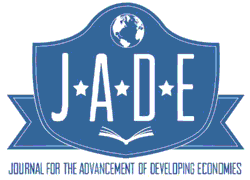Institute for the Advancement of Developing Economies

Journal for the Advancement of Developing Economies
Date of this Version
2019
Document Type
Article
Citation
Journal for the Advancement of Developing Economies 2019, Volume 8, Issue 1. ISSN:2161-8216
doi 10.32873/unl.dc.jade814
Abstract
This paper examines whether the mother’s rank (whether she is a senior or junior wife) in polygamous households in Côte d’Ivoire injects favoritism that could lead to differential investment in children (based on mother’s rank), a concern that could cause an inefficient allocation of household resources. The hypothesis is that the younger is a junior wife relative to the senior wife, the greater favoritism she will receive from the husband, and the better her children will fare. This question is analyzed employing Ordinary Least Squares on a Living Standards Measurement Survey microdataset collected by the World Bank. An interesting pattern is found: whether the senior or junior children are advantaged depends on the age difference between the senior and junior wife. Senior children are at an advantage when the age gap is small; however, investments in senior children decline as this age gap increases. For example, the child of a senior wife is nearly 4 percentage points more likely to be enrolled in school as the child of a junior wife who is 5 years younger. With an age difference of 15 years, the child of a senior wife is 9 percentage points less likely to be enrolled. Inefficient disparities in investments of polygynous children potentially affect not only the well-being of those children but also Côte d'Ivoire as a society. The finding of disparity in schooling investments speaks to a role for policies that will incentivize more rational allocations to children such as increasing women’s access to credit markets or paying mothers to keep children in school.
Included in
Econometrics Commons, Growth and Development Commons, International Economics Commons, Political Economy Commons, Public Economics Commons, Regional Economics Commons

